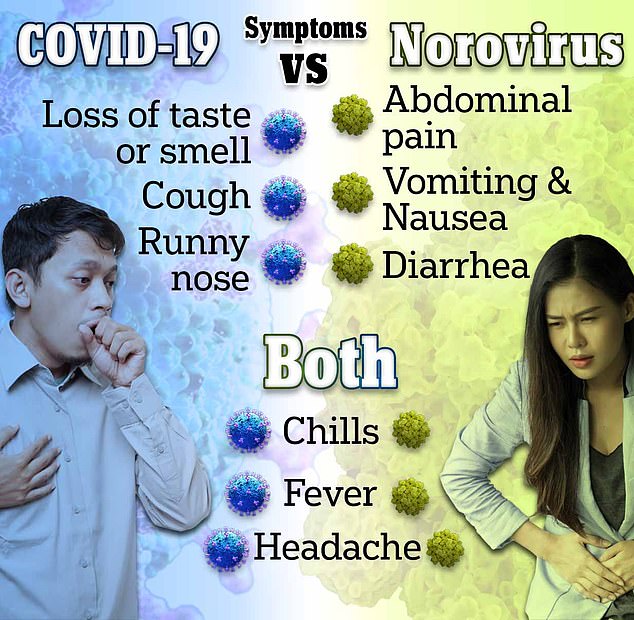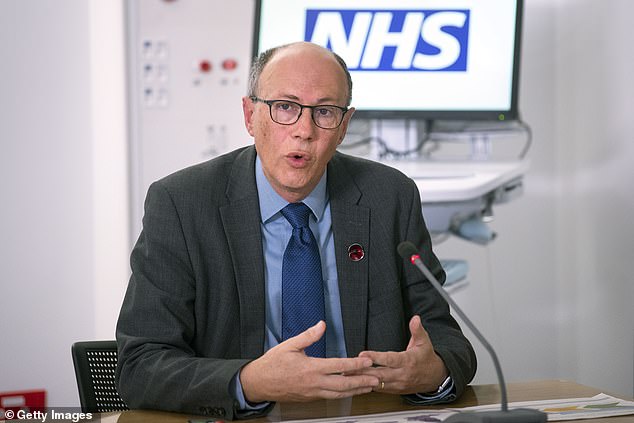The UK is on track to face the worst flu year in its history amid spiraling infections, the country’s top doctor warned today.
Surveillance programs monitoring the outbreak in the country suggest that flu hospital admissions in England have already surpassed last year’s peak and are reaching their highest level so far this winter.
The latest figures show that almost 3,000 patients have been hospitalized with the virus. Of them, more than 150 were in critical care.
But the NHS’s national medical director, Professor Sir Stephen Powis, said the worst of the tsunami hitting Britain is “yet to come”.
A ‘quadraemia’ of four winter illnesses – flu, Covid, norovirus and cold-like respiratory syncytial virus (RSV) – is also continuing to pile pressure on an overstretched health service, he added.
Experts fear the rise in infections will continue to accelerate in the coming days as a result of more people socializing indoors over the Christmas and New Year period.
They have urged people with a cough, sore throat or runny nose to limit contact with vulnerable groups, such as the elderly, pregnant women and those with underlying illnesses, for fear of becoming seriously ill from the virus.
Sir Stephen said: ‘The winter flu season has not only hit the NHS earlier this year, but is potentially on track to be one of the worst we have ever seen, as the ‘quadraemia’ continues to pile pressure on all services.
NHS national medical director Professor Sir Stephen Powis said the worst of Britain’s flu wave is “yet to come”.
‘Frontline NHS staff are currently under significant pressure, and as families and friends have gathered over the festive period and to ring in the new year, we expect the peak of seasonal viruses is yet to come.
‘Firstly, I would like to thank NHS staff – despite high demand, they continue to work tirelessly to keep patients safe and provide them with the best possible care.
‘And secondly I would like to remind the public that community services such as GPs and pharmacies are open as always for help and advice today, Thursday and Friday.
“Anyone who needs medical support should continue to use services as normal: 999 and A&E only in an emergency, and for other urgent health needs, use NHS 111 or 111 online.”
The UK Health Security Agency (UKHSA), which collects data for England, has paused its updates over Christmas, meaning the impact of festive gatherings will not be clear until early in the new year.
According to the latest weekly figures from the NHS, RSV, which is most common in babies and young children, was 25 per cent higher in the week ending December 17 than a year earlier.
Meanwhile, rates of norovirus, the winter vomiting bug, are also nearly 25 percent higher than expected for this time of year.
Some hospitals have begun limiting visiting hours and imposing mask mandates for fear of a rise in “quadraemia” cases.

Norovirus may appear similar to Covid symptoms, with both viruses causing chills, fever and headaches.
NHS trusts in Cambridge, Essex and Bedfordshire introduced new restrictions on Monday to limit the risk of infection to patients, staff and the public.
Walsall Healthcare NHS Trust and the Welsh Ambulance Service have also declared critical incidents due to a huge increase in demand for care.
On Saturday, NHS Dumfries and Galloway also introduced temporary restrictions on visiting due to a “high volume of respiratory illnesses” in the community.
Despite mounting pressures, the latest official data shows that just under one in four frontline healthcare workers in England have received a flu vaccine this year.
The Government report found that, overall, only 24.3 per cent of staff responsible for direct patient care have been vaccinated against influenza.
Analysis of the data showed that vaccination rates are lower across all staff groups, including NHS hospital staff, paramedics and GPs, this year than in the 2023 season.
Public health specialists say those with even mild cold symptoms should consider isolating themselves, as they may unknowingly carry the virus that can be fatal for older people.
In addition to avoiding family gatherings, they recommended wearing masks and social distancing in an attempt to avoid transmitting the virus.
Professor Paul Hunter, an infectious diseases expert at the University of East Anglia, told MailOnline: “If you are sick with flu you should stay away from other people for the first three days and preferably for the first week.”
“This is especially important if they are older or have medical conditions that put them at higher risk.”
Flu symptoms include fever, sore throat, muscle aches, and cough; However, Professor Hunter warned that many people are simply suffering from something similar to the common cold.
About a fifth of those infected with the flu have no symptoms but can still transmit the virus to others, he added.
Professor Lawrence Young, a virologist at the University of Warwick, also urged people with possible flu symptoms to consider lockdown-like measures.
“If you have flu-like symptoms, it is very important to think about limiting contact with other people, especially those who are clinically vulnerable to respiratory infections,” she said.
He added that it was important to consider this even if vulnerable people had received the flu vaccine as, like any vaccine, it cannot offer 100 per cent protection against serious illness.
Flu, also called influenza, is responsible for around 40,000 hospitalizations and more than 10,000 deaths in the UK each year, although this figure can be higher in bad years.


